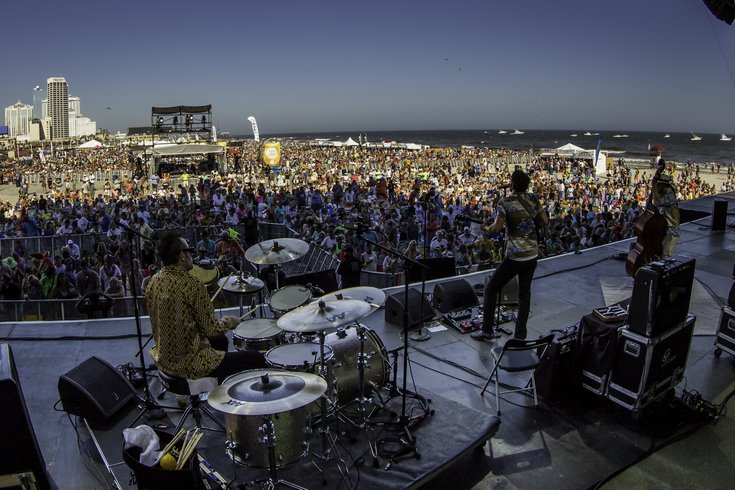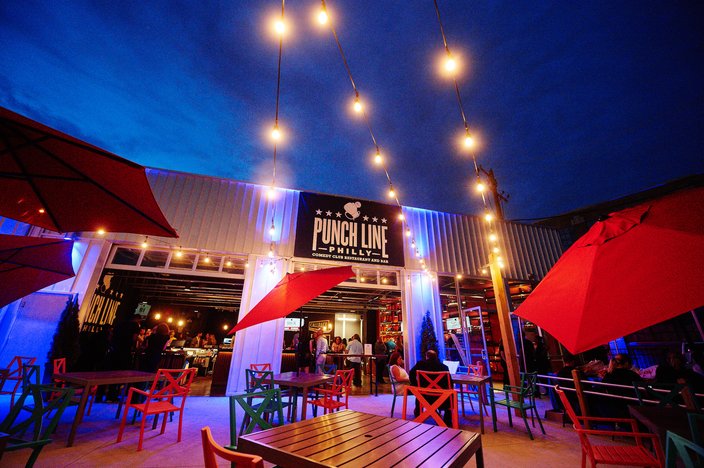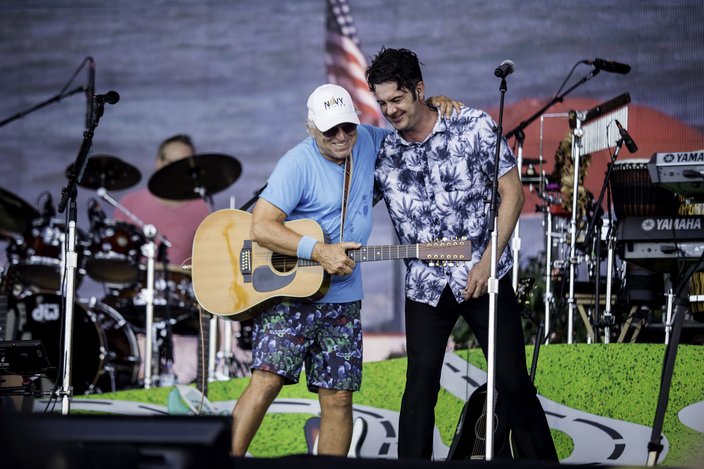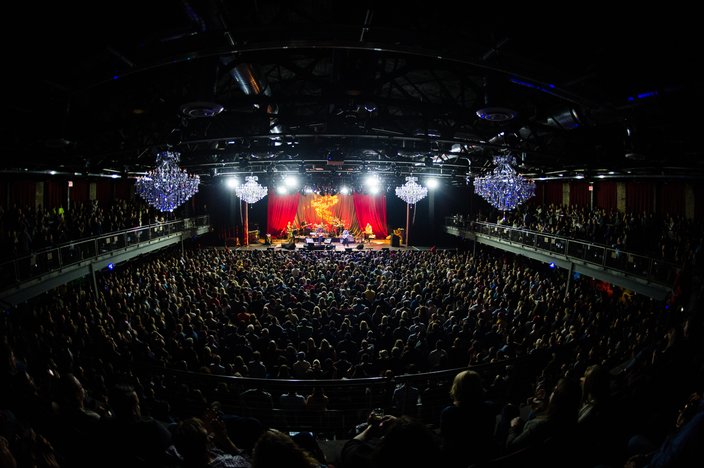
August 16, 2016
 Jacob Katznelson /for PhillyVoice
Jacob Katznelson /for PhillyVoice
Can events like the 2016 Atlantic City Beach Concert Series help jump start a city on the brink?
The heat didn’t keep more than 25,000 fans away from seeing Jimmy Buffett in Atlantic City over the weekend. The king of the so-called Parrotheads opened A.C.’s summer concert series with no shortage of salt on the margarita rims right beside the salty Atlantic. It almost seemed like a scene out of the beach city’s glory days: Scores of buses ambling into town, families braving the heat with drippy ice cream on the boardwalk and parking lots filling up with eager tailgaters. Never mind that many of the storefronts are empty, the homeless are panhandling and that the crime rate routinely makes headlines. An event like this one offers some hope to a city that’s been on the brink.
Jimmy Buffett kicked off the 2016 Atlantic City Concert Series with a beach full of Parrotheads.
But it wasn’t always like this.
When this promising beach resort became the first outside Las Vegas to legalize gambling 40 years ago, the future – built on card tables, slot machines and a parade of deep pockets coming from nearby cities – seemed very bright. But after a downturn in the economy in recent years left many of the biggest casinos scrambling to keep their doors open amid tough competition, a larger question loomed about the future of this fabled tourist destination by the sea.
Plunked on the beach between Philly and New York City, Atlantic City has long been a getaway for urban and suburbanites of all stripes – be it the day-trippers catching rays, party people looking for late-night fun and old-timers pulling the slots. In recent years, with gambling on the decline, the beachfront town has also become more of a mecca for families and shoppers thanks to activities happening outside the casinos, like popular retail outlets and entertainment.
Atlantic City, for all its charm, has long been a city built on contradictions. Its neon artificiality was both panned and praised over the years – it’s gone from being cool to being over to being cool and over more times than I can count on both hands. And the dichotomy between the rich and poor has never exactly been a close-kept secret. It’s a town that likes to reinvent itself every few years, sometimes successfully and sometimes regrettably. The Trop renovation was nothing short of dazzling, while the shiny Revel was a big fat bust. More than gamblers make wagers here, and more than just the tides come and go. A.C. may be a hard-won friend, but it’s proved its loyalty time and time again.
Live Nation, one of the country’s biggest entertainment producers and promoters, has thrown A.C. what could be a proverbial lifesaver. While Live Nation has been operating in the region for decades, surviving many of its headline-making ups and downs, in the last few years, it has taken an increased interest in both the A.C. and Philly regions, not only producing new shows and series but also opening new venues that are attracting a more diverse demographic interested in everything from live music to comedy.
These venues also seem to appeal to audiences that live and work here – often the same people who are largely left out of major events in struggling cities like A.C.
The beach concert series that kicked off last week has seen attendance increase each new season and with each new show, says Rachel Spivak, marketing manager at Live Nation. “A.C. is still thriving,” she says, noting that while some businesses have pulled out of the region because of the challenging economy, she believes that entertainment is attracting more and more people to the shore town for different reasons. And with the new business comes more jobs, which, in turn, impacts not only the city but also many sleepy little communities where most of A.C.’s very worried workforce lays its head at night.
Geoff Gordon, regional president of Live Nation Philadelphia, says that last week's concert series kickoff alone drew thousands of people to A.C., even in the midst of one of the worst heat waves of the summer. It helped the town fill up its bars and restaurants, booked hotel rooms and brought more people into the community than might ordinarily be there on a red-hot weekend night in August.
The Press of A.C. reported that retailers didn’t do much more business with the event and that hotel booking was moderate. Bars and restaurants, meanwhile, loved it.
After suffering an estimated $2.8 billion loss in gambling revenues in recent years, and with a non-seasonally adjusted unemployment rate of 10.3 percent (the eighth-worst in the nation), A.C. does not have it easy right now by any means. It also may be a little gun shy when anyone, particularly a mega corporation, offers promises that they may not be able to keep. But after owning a 30-plus-year monopoly on East Coast gambling that no longer exists, it stands to reason that this town needs something new and noteworthy to attract tourists again. Why not entertainment? Why not now?
Today, Live Nation is working with the Casino Reinvestment Development Authority (CRDA), the mayor’s office and various other municipal and city partners on programming that extends well beyond the beach series. The goal: to bring people back to A.C., a place that has been described not too nicely as the Jersey Shore’s very own Rust Belt, an eyesore with a few too many grimy, salt-soaked casino facades with chained doors (gee, thanks, Steve Wynn and Donald Trump). Companies with the bucks like Live Nation are seeing an opportunity where others might see liability, even if it does mean bandaging a few past wounds (CRDA has been criticized for evicting people from ocean-view homes to build condos – not exactly a ringing endorsement for other partnerships). But judging from Las Vegas’ efforts in recent years to make its own image a bit more family-friendly, A.C. could also benefit from alternative sources of income and interest.
Much like Detroit, A.C. is also being forced to learn how to rebuild its economy in new ways with an emphasis on dining, shopping, family events and – perhaps the surest bet of all – live entertainment.
Luckily, Gordon says that entertainment has “a large economic impact,” and that many businesses beyond the promoters are “reaping the benefits.” Investing in entertainment rather than the gambling that A.C. has invested in for decades could change the way tourists view this struggling destination, turning it from a more adult vacation spot to one where families closer to home can find some fun and unexpected opportunities along the surf.
Take Vegas again – the most talked-about attraction isn’t the gambling, it’s the live, star-studded shows that are luring audiences from around the world. A.C. could become the new Vegas with a little ingenuity and some very well-connected promoters.
In a story in U.S. News & World Report this past spring, writer Stephen Eide supposed that A.C. could actually learn a thing or two about how to hedge its bets from other bankrupt cities like Detroit, where rethinking dereliction is attracting a kind of unexpected cultural renaissance. Detroit is opening more eateries and independently owned businesses and attracting a creative class that’s rebuilding homes and investing in its future. Detroit isn’t the same old Detroit by any means. But the new Detroit could potentially be even more interesting. And much like Detroit needed to rethink its industrial push, so does A.C.
“The city is on the brink of bankruptcy due almost exclusively to a bad bet on casinos: around 20,000 industry jobs and half of annual gaming revenues have been lost in the last decade,” Eide wrote of A.C. “Gambling is an unreliable source of funding for public services.”
Much like Detroit, A.C. is also being forced to learn how to rebuild its economy in new ways with an emphasis on dining, shopping, family events and – perhaps the surest bet of all – live entertainment.
Not only is Live Nation welcoming a diverse roster of acts to the beach this summer (like blink-182, Florida Georgia Line and the Zac Brown Band), but other venues are stepping up with huge acts running the gamut from comedy to rock, as well as family-friendly and even health-conscious attractions like yoga on the beach and Tropicana’s light and sound show. Also on A.C.’s calendar is a wine and dine tour, a silent film festival, and a 5K run – and that’s just for the month of August.
“Our mission in the area is every two years we try to bring something new to the marketplace,” says Gordon. For Live Nation, this could mean a venue or an event.
In the past few years, Gordon’s set his sights on not only A.C., but also Fishtown, where The Fillmore and Punch Line opened their doors to rave reviews. Both the live music venue and comedy club, respectively, not only appeal to a wider range of audiences and age groups but also provide broader opportunities to showcase talent in the region.
The Fillmore packed for a Hall & Oates concert.
These venues also seem to appeal to audiences that live and work here – often the same people who are largely left out of major events in struggling cities like A.C. For Gordon, it’s not always a matter of going after proven destinations, like Center City or South Philly’s stadium complex; instead, newer entertainment efforts are being directed toward places like Camden and A.C. and neighborhoods in Philly that are still “up and coming” thanks to younger people moving in, more eateries and cultural opportunities popping up and interest being generated by the press and word of mouth.
How many times has The New York Times touted Fishtown lately? A lot.
Perhaps it’s ironic that for many of the same reasons its founders thought A.C. was a truly great tourist attraction, including its proximity to major cities on the Eastern Seaboard and its sandy shoreline, it’s still proving to be a great attraction, albeit an evolving one.
Gordon says that in some ways, today’s audiences are looking for the same things they always have: fun, great and memorable entertainment experiences. But with the digital saturation of streaming and online programming, something needs to stand out and offer just a bit more than it used to. Audiences, he says, are also looking for diverse acts. So while Barbra Streisand may be playing this weekend at the Wells Fargo Center, smaller, more intimate shows will hit one of the Borgata’s theaters and Boardwalk Hall.
“It’s very subjective,” he admits. “There are a lot of genres and tastes.”
But with the right balance, he’s confident that the efforts will pay off not only for Live Nation but also for the many auxiliary businesses (restaurants, bars, hotels, retailers, etc.) that experience profit when audiences show up.
Opening night at the Punch Line Philly. 
“Not too long ago, we started The Roots Picnic,” he says, and later came Made in America, a standout annual music festival with Jay-Z in the driver’s seat (this summer’s headliners include Coldplay and Rihanna). These two festivals really set the region apart from other cities by not only bringing diverse artists together but also planting them on stages in unexpected venues like the Ben Franklin Parkway.
“People will come in droves to see hip-hop, country, R&B, rock, alternative music and dance music,” he says, as well as creative blends of each. “These events are very well supported.”
It doesn’t so much depend on the venue as much as the artists, though in A.C.’s case, throwing in a beachfront view for a summer concert sure doesn’t hurt.
 Tim Becker/for PhillyVoice
Tim Becker/for PhillyVoice Jared Polin/for PhillyVoice
Jared Polin/for PhillyVoice